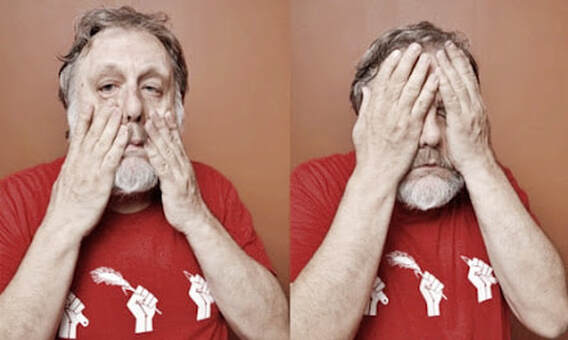|
7/1/2022 Slavoj Žižek, an apologist of Capitalism disguised as "Marxist philosopher". By: Nikos MottasRead Now"The least we owe Ukraine is full support, and to do this we need a stronger Nato [...] Today, one cannot be a leftist if one does not unequivocally stand behind Ukraine” (The Guardian, June 21, 2022). Who is the author of the above words? Is it NATO Secretary Jens Stoltenberg? Or German Chancellor Olaf Scholz? Maybe Spanish Prime Minister Pedro Sanchez? None of them. The phrase belongs to a celebrity of contemporary left-wing intelligentsia. The much publicized “Hegelian Marxist” philosopher Slavoj Žižek. Žižek's opinion on Ukraine would have been completely insignificant if the Slovenian thinker and cultural theorist had not received so much publicity in the Western media, establishing himself as one of the “most important living intellectuals”. For more than two decades, Žižek has a prominent position not only in the bourgeois press but also in the most prestigious academic institutes and think tanks in Europe and the United States. The reality is that Slavoj Žižek is the embodiment of pseudo-marxist charlatanism who, through grandiloquent analyses, incoherent and frequently contradictory philosophical mumbo-jumbo and pompous expressions, tries to “whitewash” the exploitative system itself. It is no coincidence that the charlatan who is now calling for a “stronger NATO” to defend Ukraine, is the same guy who in 1999 was an outspoken supporter of NATO's imperialist intervention and bombing of Yugoslavia. In his article titled “NATO, the Left Hand of God”, Žižek was writing among other things: "Today we can see that the paradox of the bombing of Yugoslavia is not the one that Western pacifists have been complaining about -- that NATO set off the very ethnic cleansing that it was supposed to be preventing. No, the ideology of victimization is the real problem: it's perfectly fine to help the helpless Albanians against the Serbian monsters, but under no circumstances must they be permitted to throw off this helplessness, to get a hold on themselves as a sovereign and independent political subject [...] But it's not only NATO that depoliticized the conflict. So has its opponents on the pseudo-Left. For them, the bombing of Yugoslavia played out the last act of the dismemberment of Tito's Yugoslavia. It acted out the end of a promise, the collapse of a Utopia of multi-ethnic and authentic socialism into the confusion of an ethnic war. Even so sharp-sighted a political philosopher as Alain Badiou still maintains that all sides are equally guilty. There were ethnic cleansers on all sides, he says, among the Serbs, the Slovenes and the Bosnians. [...] It seems to me that this represents a leftist yearning for Yugoslavia lost. The irony is that this nostalgia considers the Serbia of Slobovan Milosevic to be the successor of that dream state -- i.e., exactly the force that so effectively killed that old Yugoslavia" (lacan.com/zizek-nato.html, June 29, 1999). Slavoj, the outspoken supporter of NATO's horrendous crime in Yugoslavia, wasn't pleased enough of the barbarity unleashed against the Serbian people. He wanted even more bombs: “So, precisely as a Leftist, my answer to the dilemma "Bomb or not?" is: not yet ENOUGH bombs, and they are TOO LATE” (Slavoj Žižek, Against the Double Blackmail, New Left Review, 04/1999). Four years after the crime in Yugoslavia, in 2003, the Slovenian “philosopher” was stressing out during an interview: “To the horror of many leftists, even I did show some understanding for the NATO bombing of ex-Yugoslavia. Sorry, but this bombing did stop a terrible conflict" (Left Business Observer #105, August 2003).
In 2012, Žižek openly supported SYRIZA by participating in joint political events with Alexis Tsipras, while he didn't hesitate to unleash slanders against the KKE by saying that “it is the party of the people who are still alive because they forgot to die”. He is the same charlatan who, following the terrorist attacks in Paris in 2015, suggested that the antidote to the deadlock of global capitalism is the militarization of society: "Democratically motivated grassroots movements are seemingly doomed to failure, so perhaps it’s best to break global capitalism’s vicious cycle through ‘militarization,’ which means suspending the power of self-regulating economies.” (Slavoj Žižek: In the Wake of Paris Attacks the Left Must Embrace Its Radical Western Roots, inthesetimes.com, November 16, 2015). A year later, in 2016, the flamboyant thinker endorsed ultra-reactionary billionaire Donald Trump for the US Presidency, calling him a “centrist liberal”. More recently, he has been seen in political panels alongside other self-proclaimed “erratic marxists”, like former Greek Finance Minister Yanis Varoufakis. No, Slavoj Žižek is neither a Marxist nor a radical philosopher. He isn't a lunatic who expresses nonsense just because he wants to draw attention. On the contrary, he is a very well-read apologist of capitalist barbarism and a conscious anti-communist. As such, he vilifies the 20th century's socialism, he shamelessly attacks Lenin and promotes, either openly or covertly, the murderous imperialist alliance of NATO. Even when he pretends to defend communism, Žižek does it only in words, as an abstract theoretical issue, deliberately separating it from its social and political field of application. So, what does Slavoj Žižek represent? He himself has provided the answer. “In short, what the sensitive liberals want is a decaffeinated revolution, a revolution which doesn't smell of a revolution” he wrote once. That is exactly what Žižek and other widely-publicized by the bourgeois media “Marxist intellectuals” (like A. Badiou, A. Negri, T. Eagleton, etc) are: Ideological waiters of a “decaffeinated revolution” and the best apologists of the exploitative capitalist system. AuthorNikos Mottas is the Editor-in-Chief of In Defense of Communism. This article was republished from In Defense of Communism. Archives June 2022
2 Comments
7/2/2022 07:55:53 am
One of the best analyses of Žižek and what he represents: short and to the point. Deserves to be widely disseminated.
Reply
yaakov
7/4/2022 04:23:35 pm
I do not like Zizek mostly because of his opinions on Deleuze and his reading of Lacan, but this is not a critique of him. All you do is pull quotes from his articles (which he has stated numerous times that are purposely inflammatory) and not explain why he believes these things. Zizek seeks to understand capitalist Ideology and the systems behind Ideology. If you actually want to know what Zizek believes engage with primary sources (his lectures, interviews, god forbid his books).
Reply
Leave a Reply. |
Details
Archives
July 2024
Categories
All
|


 RSS Feed
RSS Feed